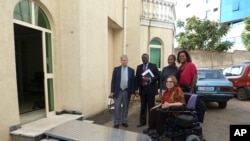U.S. Special Advisor for International Disability Rights Judy Heumann recently travelled through Africa to discuss ways to promote accessibility and inclusion for disabled citizens. Ms. Heumann and a team from the U.S. Department of State and USAID travelled to Ethiopia, South Africa and Kenya. They met with government, civil society, university and private sector representatives to learn about policies and practices in those countries concerning persons with disabilities. The team also visited embassies and USAID offices to learn how the U.S. is supporting disability rights through its activities in Africa, and what more can be done.
All three of these countries have ratified the United Nations Convention on the Rights of Persons with Disabilities. Special Advisor Heumann said she saw "sincere interest" on the part of governments and civil society to remove barriers that stand in the way of disabled persons' full participation in their communities:
"What we are looking at are opportunities where we can be sharing information about U.S. laws and other laws that had been put in place to address issues like the inclusion of disabled children in education; making higher education institutions physically accessible; removing policy barriers that preclude disabled people in other countries from attending universities or from studying in different fields."
The team also discussed ways to make healthcare and employment more accessible and how to implement accessibility standards in new construction, particularly in U.S.-funded projects.
Robert Ransom is a specialist in disability and development and a Franklin Fellow with the U.S. Department of State. He says there has been progress in Africa:
"There has been the growth of organizations for persons with disabilities as advocacy organizations that are fighting for their rights to equal opportunity and access to mainstream education, mainstream development projects, mainstream services that are available to any other citizen."
Advocates face real challenges, however. In Ethiopia, the team met with non-governmental organizations [NGOs] and found that while the government has drafted a national plan to improve access for persons with disabilities, groups that advocate for disability rights remain severely affected by recently passed laws restricting NGO activity.
In Kenya, a new constitution provides for representative seats for disabled persons in the new government. Training is needed, however, for future representatives.
Ms. Heumann noted that all of these changes will take time. The U.S. is committed to helping them become reality.
Disability Rights In Africa

U.S. Special Advisor for International Disability Rights Judy Heumann recently travelled through Africa to discuss ways to promote accessibility and inclusion for disabled citizens.



